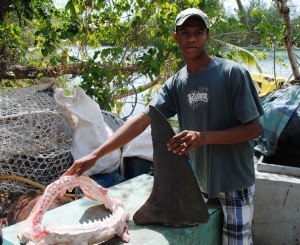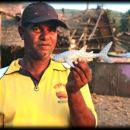In a landmark decision to save sharks from extinction, countries from around the world voted at the 16th meeting of the Convention on International Trade in Endangered Species (CITES) to regulate international trade in the Oceanic White tip, hammerhead and several other shark species. While this decision helps regulate imports to consuming market countries, sustainable use will not be achieved unless regulatory capacity in shark exporting countries is improved.
Sustainable shark fishing
In a landmark decision to save sharks from extinction, countries from around the world voted at the 16th meeting of the Convention on International Trade in Endangered Species (CITES) to regulate international trade in the Oceanic Whitetip, hammerhead and several other shark species. While this decision helps regulate imports to consuming market countries, sustainable use will not be achieved unless regulatory capacity in shark exporting countries is improved.
Sharks play a critical role in maintaining a balanced food chain in marine ecosystems, yet this role is being undermined as sharks have become one of the most exploited species on the planet. It is estimated that 100 million sharks are killed every year to supply growing demand for shark fins, meat and gills, resulting in a 97 percent drop in shark populations over the last two centuries.
In the Seychelles, the waters once teemed with Great White, Hammerhead and Tiger sharks. Yet, over the years, intensive fishing has decimated shark stocks. To combat this, the Seychelles has introduced a National Plan of Action for Conservation and Management of Sharks aimed to ensure that the sharks are harvested sustainably by both commercial and artisanal fishers.
MFF supported the National Action Plan by working with artisanal shark fishers in the Seychelles to ensure that sound fisheries methods are practiced, the rights of the fishers are protected and their livelihoods are improved. To ensure formal fishers representation in the national process an Artisanal Shark Fishers' Association was registered. To help monitor the sharks they catch, a creole language shark identification key, data collection equipment, and
standardized collection forms were distributed to fishers. The information they collect is then compiled by the Seychelles fisheries authorities and used for shark stock management. These are small but significant steps to ensure the conservation, management and long term sustainable use of sharks in the Seychelles. This model can be applied in artisanal shark fishing communities around the world.
Sharks play a critical role in maintaining a balanced food chain in marine ecosystems, yet this role is being undermined as sharks have become one of the most exploited species on the planet. It is estimated that 100 million sharks are killed every year to supply growing demand for shark fins, meat and gills, resulting in a 97 percent drop in shark populations over the last two centuries.
In the Seychelles, the waters once teemed with Great White, Hammerhead and Tiger sharks. Yet, over the years, intensive fishing has decimated shark stocks. To combat this, the Seychelles has introduced a National Plan of Action for Conservation and Management of Sharks aimed to ensure that the sharks are harvested sustainably by both commercial and artisanal fishers.
MFF supported the National Action Plan by working with artisanal shark fishers in the Seychelles to ensure that sound fisheries methods are practiced, the rights of the fishers are protected and their livelihoods are improved. To ensure formal fishers representation in the national process an Artisanal Shark Fishers' Association was registered. To help monitor the sharks they catch, a creole language shark identification key, data collection equipment, and standardized collection forms were distributed to fishers. The information they collect is then compiled by the Seychelles fisheries authorities and used for shark stock management. These are small but significant steps to ensure the conservation, management and long term sustainable use of sharks in the Seychelles. This model can be applied in artisanal shark fishing communities around the world.



